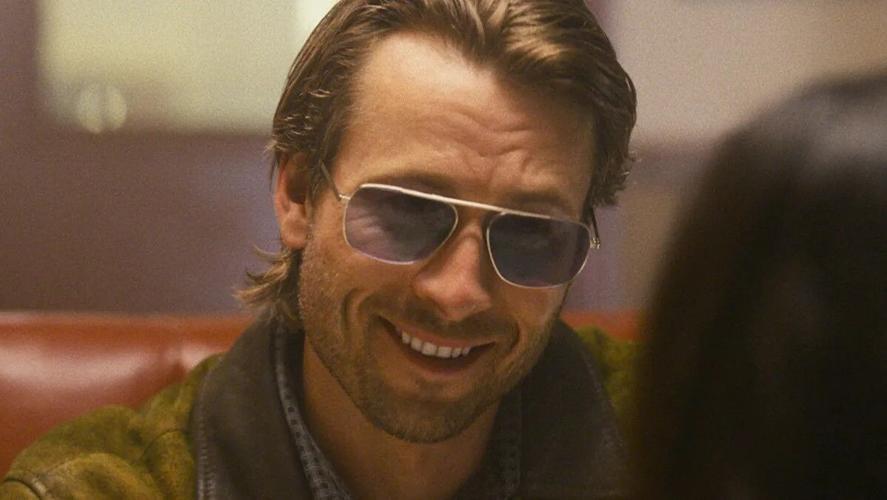Richard Linklater adapted a magazine article by Skip Hollandsworth for his film Bernie (2011), which was about a Texas man who was put on trial for murder. The real-life subject of that film was seen as a sympathetic killer because of abuse he'd suffered at the hands of his murder victim. A dozen or so years later, Linklater has again adapted a magazine article by Hollandsworth that is again tackling a real-life subject that incorporates yet another sympathetic killer due to abuse suffered at the hands of the murder victim. Linklater has taken way more liberties with this story than he did with Bernie. Those liberties include inventing murders that didn't happen. The real-life subject is currently deceased, so there won't be a Baby Reindeer (2024) kind of lawsuit here. It's clear that Linklater is too on the side of the so-called sympathetic killer. However, in Bernie, that killer was still punished, despite the sentiment. Here, the killer is basically rewarded. That left a rather bad taste in my mouth, which made me not on board with this film.
Glen Powell (Anyone But You and Top Gun: Maverick) stars as Gary Johnson, a professor at the University of New Orleans who teaches psychology and/or philosophy. He also works for the New Orleans Police Department with a unit that specifically goes after people who engage in murder-for-hire or contract killing. Once the police realize that someone is trying to hire a contract killer, they send an undercover cop to confirm and get them on tape admitting to it. When that unit's undercover cop is suspended for a couple of months, Gary is used as his replacement. Prior to this, Gary was shy, meek and basically a nerd. He was a veritable Clark Kent. Becoming an undercover cop though unlocks a suppressed desire that maybe Gary should have been an actor because Gary has to pretend to be other people, which he does in order to get suspects on tape about contract killing.

However, I'm not sure the film does enough to interrogate why Gary is so excited not to be himself. If he wanted to be an actor, he could just be an actor. The fact that he likes "acting" but only in the context of trying to catch potential criminals isn't interrogated at all here. Gary is divorced and lives alone, except with his two cats. He's not really complaining about his life though. He seems to enjoy teaching, but he also enjoys this undercover work. This film could be a metaphor for the life of a method actor and being so absorbed into a role, but there's an undercurrent that Gary isn't necessarily acting, as he's actually changing and becoming something authentic or more of himself. Obviously, he plays a variety of characters while undercover, but his one particular role of "Ron" is the one that's supposed to be something more authentic to what he wants to be, which is fine. If a person wants to behave in a certain way or change their attitude or look, that's perfectly okay, but there's no analysis as to why Gary's natural persona, which is just a meek professor, is so bad that he would want to be something else. The film never really examines that.
Adria Arjona (Father of the Bride and Morbius) co-stars as Madison Figueroa Masters, a woman who contacts someone and somehow comes to get "Ron" to be her contract killer. She wants to murder her husband because apparently he's abusive. We never see that abuse. We do get one scene where he's being aggressive and a jerk, but we never see the prior abuse. We're simply supposed to accept that she's the sympathetic killer or at least we're meant to embrace her. Madison is certainly someone that Gary embraces and it's obvious that he's attracted to her. He falls in love with her and decides to help her avoid jail time, which is something he could have done for all of the other people that he did put in jail. Yet, the film rewards him and Madison for his prejudice. Why does she get to avoid jail time but all those others don't? It's only due to his random feelings for Madison, which is not how the criminal justice system should work. Yet again, the film rewards them for it.

One could put that aside and consider this is instead a kind of dark and twisted love story in the vein of Bonnie and Clyde (1967) or Badlands (1973) or even something more recent like Lisa Frankenstein (2024). Yet, those films are about people who love each other despite the fact that they're criminals or have dark tendencies, which are things not hidden from each other. This film does have an aspect where Gary and Madison are hiding things about themselves from each other. Gary is in fact playing a role. Arguably, Madison falls in love with Ron, not Gary. Without spoiling too much, Gary also falls in love with Madison without knowing how far she's willing to go and that her violent tendency or tendency toward murder is stronger than he initially thought. When those tendencies are finally revealed, I'm not sure that the film fully reckons with both of Gary and Madison's disillusions about one another.
Austin Amelio (The Walking Dead and Everybody Wants Some!!) also co-stars as Jasper, the aforementioned, undercover cop who was suspended. He comes back to the police unit and consults on some of the cases, including the one involving Madison. He's revealed to be a dirty cop, not just for what got him suspended but also further actions that he takes. Yet, as the film goes along, we learn that Gary basically becomes a dirty cop too in that Gary does things to benefit himself and not for a greater sense of criminal justice or adherence to the law, which Gary's voice-overs say are his justifications. Again, the film never reckons with this fact. It skips over it in lieu of a happy ending, as if this film is a romantic comedy that is lighter than the dark material previously seen would suggest.

That happy ending though would in reality only be possible if the police department were as incompetent as it is revealed to be in the final act. Retta (Good Girls and Parks and Recreation) and Sanjay Rao (Bad Romance) are both comedic actors. Retta plays Claudette here and Rao plays Phil. They are the other police officers in that undercover unit. Unfortunately, they come to feel rather incompetent. When an actual murder happens, Linklater shows us none of the actual police investigation in that murder. It's waved away as the police being incapable of determining the killer or what really happened. For the majority of the film, we're meant to see the police with Gary as this super competent thing able to arrest all these potential murderers, but without him, they become this super incompetent thing not able to solve actual murders. It's inconsistent.
Since the Black Lives Matter movement and specifically the murder of George Floyd, media representation or depiction of police narratives has been more critiqued and more under scrutiny. Gary isn't technically a cop but he works for the police. He's depicted as super competent and able to bust all these potential criminals. Yet, Claudette and Phil are apparently super incompetent because they're unable to put the pieces together or investigate any further or deeper when it comes to an actual murder. Claudette is a Black woman and Phil seems like he's a Southeast Asian man, so they're the cops of color, so to portray them as incompetent or totally oblivious felt problematic. Portraying Gary as this cop who betrays the ideals of criminal justice for his own romantic feelings or selfish reasons and not have that really be something that he self-reflects or deeply examines also felt problematic.
Rated R for language, sexual content and some violence.
Running Time: 1 hr. and 55 mins.
Available on Netflix.










